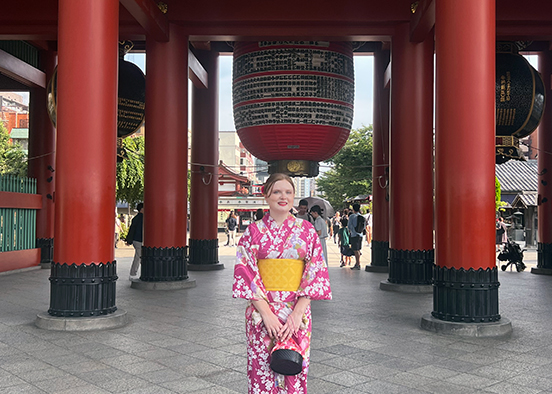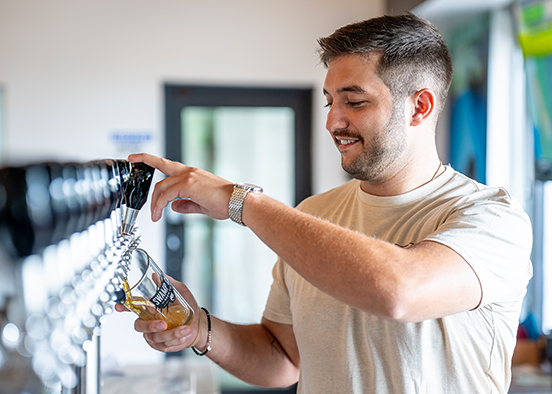Japan dream becomes reality for Eagle abroad
At 12 years old, Lillian Paulitz fell in love with Japanese culture through its popular animation. Soon, her passion spilled over from anime into cuisine.
“I’ve been cooking Japanese food since middle school,” Paulitz said with a laugh.
This summer, the FGCU Honors College senior got to live out her dream of more deeply exploring Japanese food, culture and even anime thanks to a Phi Kappa Phi scholarship that helped her attend J.F. Oberlin International University in Shinjuku.
It was a reality many years in the making.
In high school, Paulitz planned to live and study in Japan through a home-stay program. Then the COVID-19 pandemic made that plan unattainable.
In her first year at Florida Gulf Coast University, she was interested in studying abroad but missed the deadlines to apply for scholarships that would allow her dream to become a reality. Her sophomore year, the psychology major explored scholarships but wasn’t chosen. Finally, in fall 2024, Paulitz applied for about 10 scholarships and ultimately received five, including the competitive Phi Kappa Phi Study Abroad Grant, which was awarded to just 74 other students nationwide.
“What really helped was in August, I started working with Dr. Hilal Peker,” she said, referring to the director of FGCU’s Office of Competitive Fellowships. The office helps students seeking fellowships and scholarships by guiding them through applications and interviews.

During the 2024-25 school year, Peker helped 75 FGCU students identify and apply for scholarships around the world. Her advice? Prepare early and focus on being well-rounded outside the classroom through volunteer work, mentorship programs and research opportunities.
“Most of the scholarship institutions evaluate candidates holistically after looking at GPA,” she said.
According to Peker, what distinguished Paulitz from other applicants last year was her methodical approach, clear career aspirations, and extensive research experience. “She applies art therapy to support both young children and elderly individuals, demonstrating the integration of psychological training with practical therapeutic skills. Additionally, her strong background in research further enhanced her candidacy and set her apart from other applicants.”

Learning inside and outside the classroom
Abroad, Paulitz advanced her studies in psychology and art. She took four intensive courses: two in Japanese language, one in gender studies and one called “Japanese Anime and Pop Culture.”
She said she appreciated seeing and learning about different forms of Japanese art, including traditional ceramics. “That gives me more tools in my toolbox for giving people more forms of art therapy in the future.”
Her classmates were mainly from other Asian countries and the U.S., but they all had something in common: They loved Japan’s convenience store food.
“Their convenience store food is very high-end,” Paulitz said. “It’s easy to go out for very cheap.”
Within bustling urban Tokyo, she noticed a serene side of Japan.
“It was very refreshing. I am on the autism spectrum, and the way that Japanese society is structured is very helpful for how my autism presents itself because it’s very rule-oriented. You don’t need to talk to anybody. It wasn’t chaotic.”
Outside of Tokyo, Paulitz enjoyed many adventures. She went rope climbing and whitewater rafting in nearby mountains and explored the famous Senbon Torii, a hiking trail covered with thousands of vermilion gates, or torii, that begins at the Fushimi Inari Shrine in southern Kyoto.
“I loved being there,” she said. “My favorite memory is we were going up the torii gates, and there was a little side road, and we found this beautiful hidden shrine. Nobody was there. It was very peaceful.”
Returning with new resolve
Inspirational moments such as these helped Paulitz reflect on and rekindle her passion for art therapy. She also was starkly reminded of the importance of therapy and other mental health services; the train she rode to classes was stopped on several occasions in the two months she was in Japan due to individuals jumping in front of the train.
“That just opened my eyes about the invisible need for mental health in Japan,” she said. “That need has made me more determined.”
Paulitz returned to the U.S. with new resolve, new friends and a desire to study abroad again.
Opportunities to do so are expanding through new partnerships and programs. Last year, participation in study abroad programs increased 30%, with 250 students traveling to 27 countries for academic credit and an additional 106 in international service-learning, according to FGCU’s Global Engagement Office.

Latest FGCU News
- 3 wildlife predators that signify a healthy campus ecosystem
- 5 tiny creatures with a big campus presence
- From electronics to ales, alum keeps business ventures brewing
- Robot faces, fresh spaces and bold ideas launch FGCU’s fall semester
- From stealing bases to studying forensics, softball star sets the pace
- 10 public artworks that capture culture on campus













